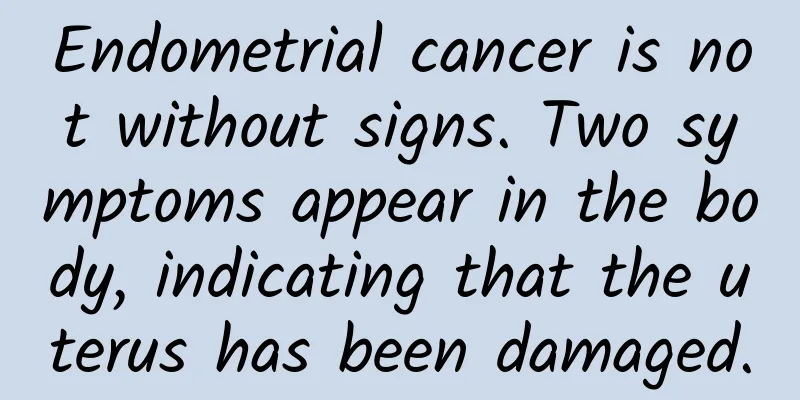Endometrial cancer is not without signs. Two symptoms appear in the body, indicating that the uterus has been damaged.

|
Aunt Li is 50 years old this year. She is usually in good health and rarely catches a cold. But recently, she has been feeling some pain in her lower abdomen and her menstruation has become irregular. She wondered, "What's going on? Could it be..." Aunt Li's worries are not unfounded. As a gynecologist, I have seen too many cases like Aunt Li's. Endometrial cancer, a word that sounds scary, is actually not without signs. Today, I will talk to you about this topic, hoping to attract the attention of middle-aged female friends. 1. Why is endometrial cancer silent? Endometrial cancer, also known as endometrial adenocarcinoma, is a malignant tumor that occurs in the female reproductive system. It mainly affects the endometrium, the lining of the uterus. Endometrial cancer is usually more common in women aged 50-60 years, but the number of younger patients has also increased in recent years. The exact cause of endometrial cancer is not yet fully understood, but studies have shown that long-term estrogen stimulation, genetic factors, environmental factors, and lifestyle are all related to the occurrence of endometrial cancer. For example, metabolic syndromes such as obesity, diabetes, and high blood pressure are considered risk factors for endometrial cancer. In fact, endometrial cancer is not without signs. Two symptoms in the body indicate that the uterus has been damaged. 2. What are the signs of the arrival of endometrial cancer? 1. Irregular bleeding is one of the "alarms" First of all, we must understand that menstruation is a barometer of women's health. If you have passed menopause and suddenly have excessive menstruation or prolonged menstruation, you should be careful because this may be the result of endometrial cancer. Of course, irregular bleeding is not necessarily cancer, it may also be a sign of other gynecological diseases. But in any case, once this happens, you should go to the hospital for examination as soon as possible to avoid delaying treatment. 2. Don’t treat lower abdominal pain as a “chronic illness” In addition to irregular bleeding, lower abdominal pain is also a common symptom of endometrial cancer. Many women tend to mistake lower abdominal pain for "chronic illness" or "menstrual pain" and ignore it. However, I want to tell you that lower abdominal pain is not necessarily a small matter. If your lower abdominal pain persists or becomes more severe, you should be alert. Because this may be a "help signal" from endometrial cancer. So, how should we prevent it in our daily lives to protect our uterus? 3. What do we need to do to prevent endometrial cancer? Lifestyles that prevent endometrial cancer mainly include the following aspects: Balanced diet: Eating a balanced diet with adequate amounts of nutrients, especially fiber-rich foods such as whole grains, legumes, vegetables, and fruits, can help maintain weight and reduce the risk of some cancers. 1. Control Weight: Being overweight and obese increases your risk of endometrial cancer. You can reduce this risk by managing your weight through a balanced diet and regular exercise. 1. Exercise Regularly: Moderate physical activity can reduce the risk of endometrial cancer. It is recommended to do at least 150 minutes of moderate-intensity or 75 minutes of vigorous-intensity exercise per week. Limit Alcohol: Excessive drinking can increase your risk of several cancers, including endometrial cancer. It is recommended to limit alcohol intake to no more than two drinks for men and one drink for women. Avoid smoking: Smoking is linked to several cancers, including endometrial cancer. Quitting smoking can significantly reduce your risk of the disease. Regular medical check-ups: Regular gynecological examinations, including cervical smear tests and pelvic ultrasounds, can detect symptoms of endometrial cancer early. Know your family medical history: If there is a history of endometrial cancer or other hereditary cancers in your family, you may need more frequent screening or additional preventive measures. Managing hormone levels: Long-term use of estrogen may increase the risk of endometrial cancer. Before using any hormone replacement therapy, you should consult your doctor and use progesterone if necessary to achieve hormone balance. The above lifestyle adjustments can help prevent the occurrence of endometrial cancer to a certain extent. However, even with all these precautions, the risk of disease cannot be completely ruled out, so regular medical examinations are still very important. Endometrial cancer is not a scourge, it is not terrible. What is terrible is our ignorance and neglect of it. As middle-aged women, we should pay more attention to our physical health, and seek medical attention in time if there is any abnormality. Finally, I would like to say one thing to all middle-aged women: Take care of yourself, starting now! Don't wait until serious problems occur in your body before you regret it. Let us work together to be healthy, beautiful and confident women! |
<<: Do hermaphrodites really exist? Do they have both female and male organs? Doctors explain
Recommend
Things to note after painless abortion
In clinical practice, artificial abortion mainly ...
How to fix a crooked body? Try the side-sitting glute stretch to relax the pelvic muscles and hip joints and lose weight
Glute stretches are actually a… whole exercise th...
What should I do if my vulva is itchy, red, swollen and eroded?
What should I do if my vulva is itchy, red, swoll...
The harm of uterine cysts
The harm of uterine cysts mainly depends on the t...
What causes congenital absence of vagina?
Some female friends will be born without vagina, ...
What are the causes of ovarian cysts?
What is an ovarian cyst? What are the causes of a...
What is the treatment for vaginal candidal infection?
In recent years, the incidence of fungal vaginiti...
What are the commonly used drugs for the treatment of premature ovarian failure?
What are the commonly used drugs for premature ov...
Is cervical erosion contagious during sex?
Is cervical erosion contagious during sex? Nowada...
Common causes of bacterial vaginosis
Bacterial vaginosis has a great impact on the pat...
What should I pay attention to after abortion?
What should I pay attention to after abortion? Ab...
What are the medicines for early menstruation?
What are the medicines for early menstruation? As...
What should I do if I have multiple uterine fibroids? Can I still get pregnant if I have multiple uterine fibroids?
Can you get pregnant with multiple uterine fibroi...
Vulvar itching and abnormal vaginal discharge
Symptoms of vulvar itching and abnormal vaginal d...
What is the effect of pelvic inflammatory disease enema? Rapid relief
For patients with pelvic inflammatory disease, Ch...









